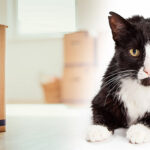Feral cats are very different to your usual pet or even ranch cat. They have had limited human contact as kittens and are often very wary of people … [Read more...]
Tips For Taking Your Cat To Another House
Are you thinking of taking your cat to another house? I know of cat owners who take their cat to visit their in-laws every Sunday. And even people who … [Read more...]
What Size Cat Collar Do I Need?
The size of cat collar you need will depend on your cat's breed and age. Kittens start tiny and grow fast. Most kittens need a 6 inch collar to start … [Read more...]
What To Do With Your Cat During Housing Showings
Smart sellers think about what to do with their cat during house showings ahead of time. Some decide they can trust their cat to stay in place and be … [Read more...]
What To Do Before You Neuter Your Cat
Understanding what to do before you neuter your cat is an important part of the process. After all, it may be a routine procedure for veterinarians, … [Read more...]
What To Feed A Stray Cat
Stray cats eat a really wild diet of mice, rats, birds and human scraps. But if you want to help them survive the cold seasons then you can sometimes … [Read more...]
Your Female Cat In Heat
When you have a female cat in heat, your household might become a little disrupted. Wailing, restlessness, excessive affection and crawling around … [Read more...]
Blind Cat – Why Cats Go Blind & How To Care For A Cat With Sight Loss
A blind cat might have lost their sight for many reasons, some of which resolve themselves or can be reversed, and some of which are … [Read more...]
How To Get A Cat Out Of A Tree – 5 Steps To Safe Cat Retrieval
Working out how to get a cat out of a tree is a problem most cat owners hope they never have to face. It’s imperative not to risk your own safety in … [Read more...]
Cat Dementia – Signs, Treatments & Tips For Living With A Senile Cat
The words "senile cat" and "cat dementia" can be very scary for cat owners. You spend years with a cat, getting to know her and growing to love her … [Read more...]









